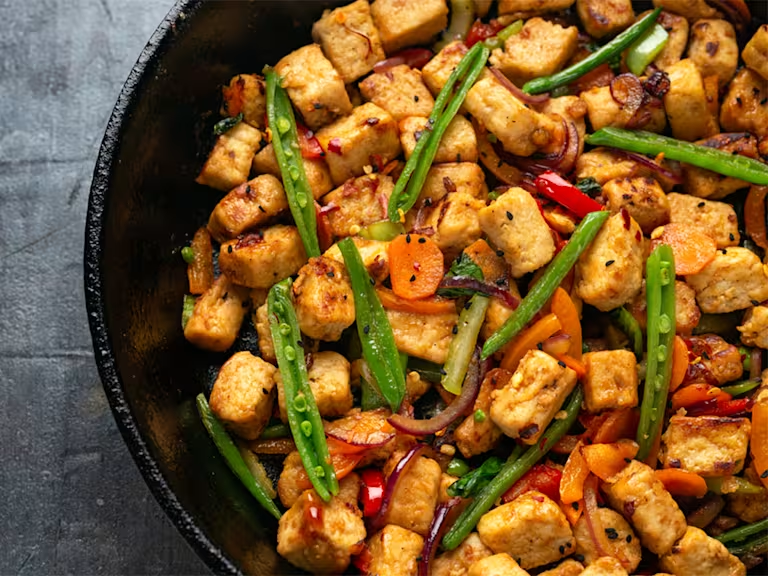
Which is Better for You & the Planet: a Meat-Free or a Meat-Eating Diet?

More people are choosing to go meat-free for a variety of different reasons. These reasons could be religious, for health reasons, or because they sympathise with the plight of the animals. Other reasons include choosing a diet with less environmental impact, to reduce their carbon footprint or to lead a more sustainable life to improve provisions for the future.
More people are choosing to go meat-free for a variety of different reasons. These reasons could be religious, for health reasons, or because they sympathise with the plight of the animals. Other reasons include choosing a diet with less environmental impact, to reduce their carbon footprint or to lead a more sustainable life to improve provisions for the future.
The meat industry has had an enormous impact on the environment, as cattle and the equipment used to process them produce high levels of greenhouse gas emissions; which is diminishing our ozone layer at a quick rate. This damage has lead directly to climate change, and if we continue to process meat globally at the scale we have been; our planet is in grave danger.
Saving our planet is everyone’s responsibility, and it is our job to do our part in leading more eco-friendly and sustainable lives. This will ensure that our current resources are not depleted for future generations and guarantees our survival as a species.
A big part of being eco-friendly is the choice and opportunity to go meatless. If two people went meatless for even just one meal a day or per week, the reduction in our carbon footprints are significant. These savings are the equivalent to boiling 776 kettles and saving 17 days of personal water.
As with every diet, it’s important to have a mix of protein, healthy fats, vitamins and carbohydrates to ensure your body is running efficiently, as whether your diet is meat free or contains meat, your diet will not be healthy if it is not balanced.
If you’re living on a diet of fast food, unhealthy snacks and little to no vegetables; your body and diet will suffer regardless.
By going meatless one meal a week, you’ll enjoy some weight loss benefits as well. Your next Meatless Monday will save you the calorie equivalent of 3 chocolate biscuits, and the dietary fat reduction of 4 teaspoons of butter!
So, is it possible to live an eco-friendly healthy lifestyle that still involves meat consumption? Let’s look at both a meat free eco-friendly diet compared with a meat eco-friendly diet to find out which diet is better for its environmental impact.
Meat free diets
Meat free diets tend to be more green, healthy, and low in fat, which helps prevent heart disease and cancer, whilst also being high in calcium which promotes strong bones and teeth. Individuals who abstain from meat also tend to be slimmer, with less of a need to count calories or watch their diets due to the high level of nutrition they intake.
Meat free diets are known to save more money than meat-eating diets, due to the lesser fees of production and retail when it comes to the foods they’re choosing to consume.
Lamb, beef and pork are some of the foods with the highest carbon emissions, meaning that the emissions made during the transportation, processing, waste disposal and retail of these animals are particularly high. Unsurprisingly, on the other end of the scale, meatless products such as tofu, tomatoes and lentils deliver the lowest emissions for production of processed food. Free range eggs produce less emissions than white or red meat, with one kilogram of protein from free range eggs producing 0.2kg less emissions than their meat protein counterpart. Of these emissions, 63% represented the carbon embodied within poultry feed.
Meat diets
We’ve discussed the environmental impacts of choosing a diet that includes meat, but there are often many reasons people still choose to eat it. These reasons could be due to vitamin deficiencies within the body, religious reasons or simply because they prefer the taste of meat. Whilst it has been true in the past that some meat free options have not met their meat-flavoured match, today meat free consumers enjoy a much larger variety of meatless options that taste as good or even better than meat.
If you wish to include meat in your diet, it’s recommended to choose types of meat that produce lower carbon emissions (such as chicken) as a better option for promoting an eco-friendly lifestyle. It is further recommended to reduce your meat consumption to 100g a day to truly make a positive environmental impact. For many meat eaters, this is less than half to what they are used to eating.
Another way to have an eco-friendly meat diet is to choose products that are organic or labelled ‘free range’. These animals generally have more access to their natural environment and are treated with kindness and respect throughout their lives.
More Singaporeans switching to meat free diets
Singapore is adopting more meat free options to meet the growing demand of those choosing to go meatless throughout the nation. As the interest in adopting a healthier lifestyle or living a more eco-friendly existence rises; Singaporeans looking for meat free dishes are being treated to new taste innovations and a bigger variety of foods to choose from than ever before.
Are you ready to go meatless for just one meal per week, or maybe even altogether?
Quorn’s delicious range of meatless products are not only delicious, but environmentally friendly; so you can feel twice as good every time you buy them. Nutritious items such as meatless mince, fillets, burgers and sausages ensure making the switch to a semi meat free or full meat free diet is easier than ever before. Quorn products are now available in Singapore at these retailers.




